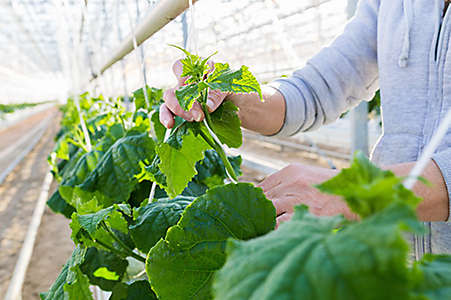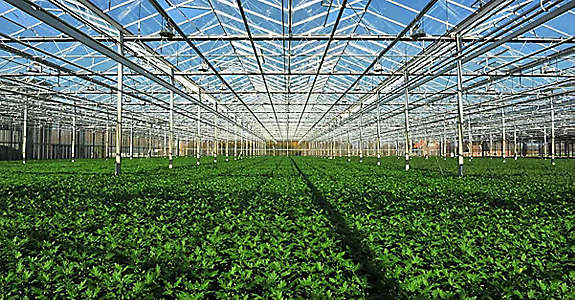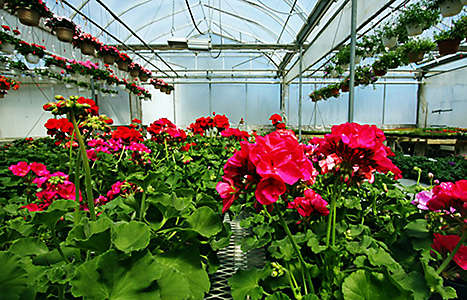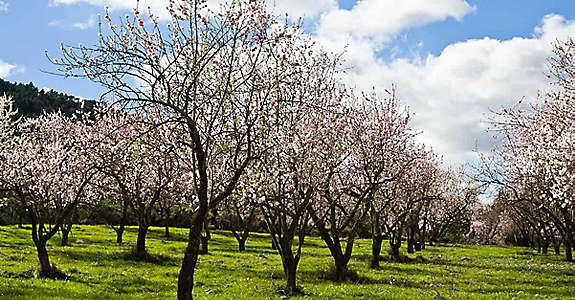FLEXIBILITY
The use of biological products in crops for disease and pest control is still a relatively new option for specialty crop growers. However, education on practical usage is key. We want to bring specialty crop growers' education on botanical oil-based biologicals to the next level, as their mindsets are shifting toward a more sustainable and more efficient way to farm.
What are botanically-derived biologicals?
According to The Biopesticide Industry Alliance (BPIA), Biologicals are “naturally occurring compounds or synthetically derived compounds that are structurally similar (and functionally identical) to their naturally occurring counterparts”. Biologicals are divided into various subcategories of products, including plant extracts, organic acids, insects and plant growth regulators, pheromones, minerals and microbes. Botanicals fall into the plant extract type of biologicals.
So, what are botanical oil pesticides? If you search it on the internet, you will find a large spread of answers to your question. During our search, we found some articles giving definitions such as, “Botanical pesticides are effective, sustainable, and safe products that are made from naturally occurring chemicals (oils) which are extracted from plants like peppermint, rosemary, thyme, garlic, and others.”1 Indeed, there are many other perspectives on this topic. One says something similar: "Plants use self-created pesticides as a form of defense against diseases, herbivores, and insects. The insecticides made with these natural pesticides have minimal to no toxic effect on the environment while acting fast to tackle insects."2 Another says that plant-based botanical insecticides are new and natural, and they offer effective, low mammal toxicity, environmentally friendly alternative to conventional insecticides.3 Lastly, The BPIA claims, "Biological products provide an effective solution to increasing quality and yield while meeting the industry demand for sustainable controls."
As you can tell, many people are involved in this growing industry who offer their perspective and take on botanical oil-based pesticides. Speaking of the demand, is this market for botanical pesticides existent and legitimate? According to BPIA, today's market for biological controls is $3 billion, and by 2025, the demand is expected to be $11 billion. Another market analysis report done by Data Bridge Market Research says, "Global crop oil concentrates market is expected to rise from its initial estimated value by registering a substantial CAGR of 5.4% during the forecast period of 2019-2026. This rise in market value can be attributed to the demand for precision farming."
Why does it matter?
What is contributing to this growing market? What is causing this increasing interest in botanical-based products? There are many benefits to using botanical oil-based pesticides over other ways of pest control.
First, let us remind growers of some of the realities of synthetic chemicals. Conventional synthetic chemistries have been pivotal to ensure crop security for decades and allowed for our incredible production capacity up to this point. However, there are some detrimental impacts of concern. Synthetic chemicals can induce a persistent buildup of toxic substances in the environment, soil, water, and even in the crop itself, making them dangerous to people, pets, or livestock. Moreover, synthetic chemicals are made up of particular, engineered uniform molecules, and overtime, certain pests can overcome the toxic effects by developing resistance to these molecules. And finally, because of their persistent and robust effect compared to naturally-occurring chemicals, they can negatively affect beneficial insects, bees, and pollinator populations.
Now, let's highlight some of the main benefits of botanical insecticides in horticulture and the advantages for growers:
- They have a friendly worker safety profile, allowing minimal PPE and a very short to sometimes zero re-entry interval
- They provide flexibility to growers with their very short, sometimes zero pre-harvest intervals to allow them to apply when they need it the most without worrying about running out of time.
- They generally do not pose problems with residue limits on fresh and processed foods. Check for the MLR exempt claim that indicates that feature.
- They typically have less restrictions on the number of applications per growing season on their labels.
- They mix well with many other products allowing for un-planned additions or substitutions in an IPM program, as they can also be used as stand-alone. Always follow labeled tank mix guidelines when adding new biologicals to a chemical mix.
- Some have a very targeted approach and application, having little to no effect on non-target insects, including beneficials. This reduces resistance potential.
- They are sustainable and less harmful to the environment as they do not persist after application.
- They are an excellent resistance management tool. The compounds' complexity in essential oil provides multiple modes of action of the active ingredients, limiting the likelihood of target pests developing pesticide resistance.
- And they DO WORK! These products have been shown to be effective in increasing yield and improving profit. Most of the suppliers run trials in comparison with commonly use chemicals and it can be surprising how nature-based products work as well and sometimes even better than conventional chemistry without the hurdle of all the restrictions.
CONVENIENT
MRL EXEMPT
SAFE
Kemin Crop Technologies has recognized this opportunity to provide effective and safe botanical oil solutions to growers while benefiting the environment.
However, often, some growers assume that because these products come from highly variable natural sources, it might lead to inconsistency in formulation and quality, making them not fully reliable crop inputs. Kemin Crop Technologies has been able to streamline these botanical extracts for active ingredient consistency and ensure reliable efficacy.
How - Our expertise and passion for botanicals
The interest in botanicals started years ago with Kemin Industries. The Kemin Specialty Crop Improvement (SCI) plant science program has decades of experience in breeding, sustainably growing our own plants (oregano, rosemary, spearmint, potato and marigold), extracting their oil and manufacturing key active compounds. Kemin has scientifically advanced plant lines that provide superior ingredients to use in consumer products that benefit the animal feed, pet food, human food, nutraceutical, aquaculture, textile and the commercial horticulture markets.
Not only do we have the advantage of having our own supply of oil extract, we also know how to source pure and high-quality essential oils that have effective active constituents from other locations worldwide due to our global presence. Kemin has spent years learning how to distinguish quality oils that will make an effective product for our customers. The naturally occurring defensive properties of the compound extracted from Kemin botanicals displace those made with synthetic chemical reactions or extracted from poor sources. At Kemin Crop Technologies, we know and trust the oils we get from the Kemin labs because our research and development staff excel in:
- Identifying and analyzing different plants that naturally produce molecules and understanding their potential active or functional benefit,
- Screening of biologically active compounds,
- Extracting oil to create a consistent, high-quality and reliable supply of the active ingredient,
- Developing effective and uniform botanically derived insecticides.
The love for complex plants and their naturally derived active ingredients is common to all Kemin team members. We have passion in discovering new botanical oil-based solutions and bringing them to consumers.
Subscribe to our blog
Resources
- 1 https://www.buschsystems.com/resource-center/knowledgeBase/glossary/what-are-botanical-pesticides#:~:text=These%20Botanical%20Pesticides%20include%20chemicals,acting%20fast%20to%20tackle%20insects.
- 2 http://www.livingwithbugs.com/botanical_insecticide.html
- 3 https://www.planetnatural.com/product-category/natural-pest-control/natural-pesticides/
- 4 http://www.livingwithbugs.com/botanical_insecticide.html
- 5 https://www.buschsystems.com/resource-center/knowledgeBase/glossary/what-are-botanical-pesticides#:~:text=These%20Botanical%20Pesticides%20include%20chemicals,acting%20fast%20to%20tackle%20insects.
- 6 https://mycorrhizae.com/the-benefits-of-botanical-insecticides/
- 7 https://landscapeipm.tamu.edu/types-of-pest-control/chemical-control/organic/botanical/
- 8 https://www.kemin.com/na/en-us/company/plant-science

Nine Steps To Follow For Building A Strong IPM Program

Five Tips for Successful Tank Mixing - Expert Tips

Eight Tips for Integrating a New Product Into Your Spray Program

Five Steps to Run a Successful Commercial Horticulture Trial
Browse Latest Articles by Topic
- Field Scouting for Common Pests in Hops
- Nine Steps To Follow For Building A Strong IPM Program
- Five Tips for Successful Tank Mixing - Expert Tips
- Eight Tips for Integrating a New Product Into Your Spray Program
- Five Steps to Run a Successful Commercial Horticulture Trial
- Insight: Shortage of beneficial insects during the pandemic
- Beneficial Ladybug Shortage on the West Coast: Why & What's Next?
- Fight the threat of Spotted Wing Drosophila in Blueberries with Kemin botanicals
- Six Tips for a More Effective and Safe Pesticide Spray Coverage
- The What & Why of Botanical Oil-Based Biopesticides

